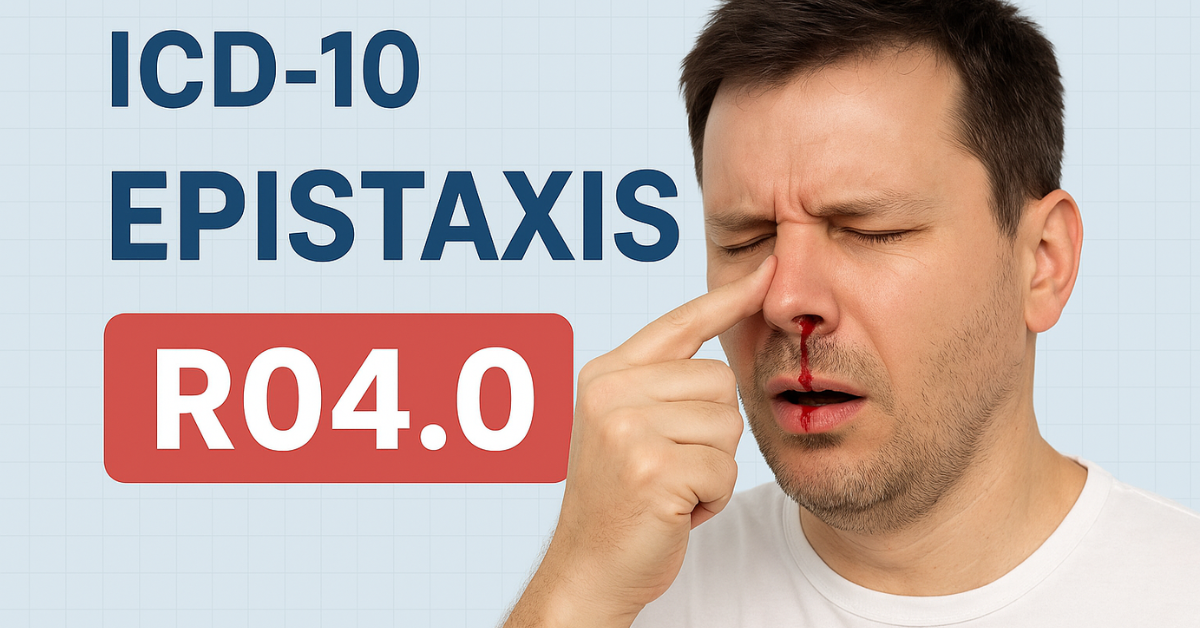Epistaxis, commonly known as nosebleed, is one of the most frequent ENT (Ear, Nose, and Throat) emergencies worldwide. Medical billing and coding professionals must document it accurately using the correct ICD 10 code for epistaxis to ensure flawless insurance claims and clinical reporting.
The official ICD 10 code for epistaxis is R04.0, categorized under hemorrhage of the respiratory system. In this comprehensive guide, we will explore everything including coding guidelines, causes, types, symptoms, treatment, billing tips, and common FAQs.
📌 What is Epistaxis?
Epistaxis is the sudden bleeding from the nose caused by rupture of blood vessels in the nasal cavity. Most cases are non-serious and self-limiting, but some may require urgent medical attention.
📌 ICD 10 Code for Epistaxis
| Condition | ICD 10 Code |
|---|---|
| Epistaxis / Nosebleed | R04.0 |
| Hemorrhage from throat | R04.1 |
| Hemoptysis (coughing blood) | R04.2 |
| Hemorrhage from respiratory passages, unspecified | R04.9 |
✅ Primary code used in clinical and billing documentation is: R04.0
📌 ICD 10 Coding Guidelines for Epistaxis
- Use R04.0 only when the nosebleed is not linked to trauma, surgery, or cancer.
- If epistaxis happens due to injury, use the trauma code instead of R04.0.
- If caused by a foreign body, code the foreign body first, then associated bleeding.
- For bleeding associated with blood-thinning medication, code the adverse drug effect alongside R04.0.
📌 Types of Epistaxis
1. Anterior Epistaxis (Most Common)
- Originates from the front part of the nasal septum (Kiesselbach’s plexus)
- Usually mild, easy to control
- More common in children and young adults
2. Posterior Epistaxis (Serious)
- Originates deep inside the nasal cavity
- Heavy bleeding, often needs medical intervention
- More frequent in older adults with hypertension
📌 Common Causes of Epistaxis
Local Causes:
✔ Nose picking
✔ Dry nasal mucosa
✔ Nasal trauma
✔ Sinus infections
✔ Allergic rhinitis
✔ Foreign body in the nose
Systemic Causes:
✔ Hypertension
✔ Blood clotting disorders
✔ Liver disease
✔ Leukemia
✔ Use of anticoagulants (warfarin, aspirin, etc.)
📌 Symptoms of Epistaxis
- Sudden nose bleeding from one or both nostrils
- Blood dripping into the throat (posterior bleed)
- Dizziness or weakness (in severe cases)
- Feeling of fluid in throat or frequent swallowing
📌 When is Epistaxis an Emergency? 🚨
Seek immediate medical attention if:
⚠ Bleeding lasts more than 20 minutes
⚠ Occurs after a head injury
⚠ The person feels faint or weak
⚠ Bleeding is very heavy
⚠ Patient is on blood thinners
📌 Diagnosis of Epistaxis
Doctors may perform:
- Physical nasal examination
- Blood pressure check
- CBC (Complete blood count)
- Coagulation profile if bleeding disorder suspected
- Nasal endoscopy in recurrent cases
📌 Treatment Options for Epistaxis
Initial Home Care:
✅ Sit upright and lean forward
✅ Pinch soft part of nose for 10–15 minutes
✅ Apply cold compress
Medical Treatments:
✔ Nasal cauterization
✔ Nasal packing
✔ Topical vasoconstrictors
✔ Surgical arterial ligation in severe cases
📌 Documentation Tips for Medical Coders
To code accurately, ensure patient chart includes:
✔ Location of bleed (anterior/posterior if known)
✔ Cause (if identified)
✔ Associated conditions (hypertension, trauma, medications, etc.)
✔ Treatment provided
🔥 Highlighted Key Points
⭐ ICD 10 Code for epistaxis = R04.0
⭐ Do NOT use R04.0 if bleeding is due to trauma, tumor, or surgery
⭐ Most cases are anterior epistaxis and non-life-threatening
⭐ Posterior bleeds are major emergencies
⭐ Correct documentation prevents billing denials
📌 Common Billing Mistakes to Avoid
❌ Using R04.0 for trauma cases
❌ Missing documentation of blood-thinner use
❌ Not coding underlying causes when known
❌ Failing to specify associated diagnoses
FAQ – Frequently Asked Questions
1. What is the ICD-10 code for nosebleed?
The ICD 10 code for nosebleed or epistaxis is R04.0.
2. Can I use R04.0 if the nosebleed is caused by trauma?
No. If the bleeding is trauma-related, use the appropriate injury code instead of R04.0.
3. What is the difference between anterior and posterior epistaxis?
Anterior epistaxis comes from the front of the nose and is mild, while posterior epistaxis is deeper, heavier, and often an emergency.
4. Is epistaxis a medical emergency?
It can be, especially if bleeding is heavy, prolonged, or the patient is on anticoagulants.
5. How is epistaxis treated medically?
Through nasal packing, cauterization, topical medications, and sometimes surgery for severe cases.
✅ Final Thoughts
Understanding the ICD-10 code for epistaxis (R04.0) is essential for accurate clinical documentation and smooth medical billing. Proper coding reduces claim rejections and helps healthcare professionals manage patient records effectively.
Latest Post
- Posterior Hip Dislocation: Causes, Symptoms & Treatment
- Dog Dislocated Hip: Symptoms, Treatment & Care
- Dislocated Hip Symptoms: Early Signs, Pain Patterns, and When to Seek Medical Help
- ICD 10 Code for Benign Prostatic Hypertrophy: Complete Coding & Clinical Guide
- Strep Pharyngitis ICD 10: Complete Guide for Diagnosis and Medical Coding
